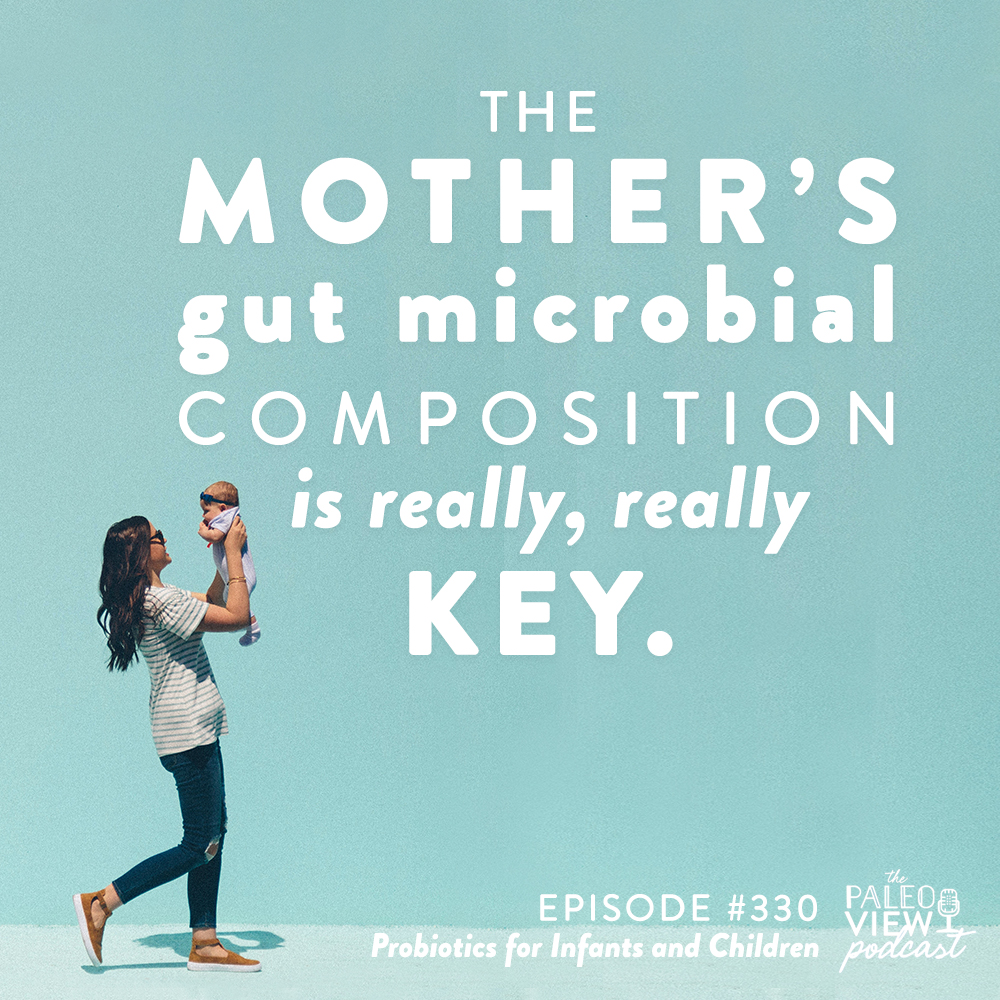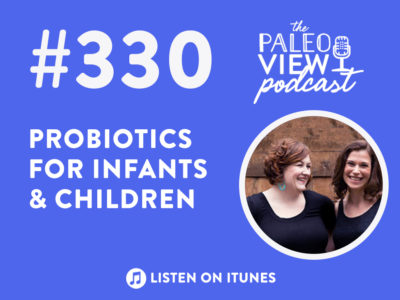In this week’s episode, Sarah and Stacy go one level deeper in the connection between gut health and probiotics, this time with a focus on infants and children. What factors impact the formation of the gut microbiome? How does a vaginal birth and breastfeeding affect a baby’s gut bacteria species? And how can you support a healthy gut microbiome, especially in C-section or formula fed children?
Click here to listen in iTunes
or download and listen by clicking the PodBean Player below
![]()
If you enjoy the show, please review it in iTunes!
The Paleo View (TPV), Episode 330: Probiotics for Infants and Children
-
- (0:00) Intro
- (0:40) News and views
- Sarah says she is extra bubbly, but possibly not that coherent of a mood today. Who knows what will happen!
- Sarah has come to the realization that we never really grow up, but she’s learned that her capacity to juggle everything and “just keep swimming” has increased dramatically.
- Stacy agrees and adds that this time of year results in a lot more stress – both good and bad – which can quickly fill our plates!
- This week’s topic is a continuation of last week’s, The Link Between Carb Intolerance and Gut Health, but focused on infants and children, particularly those that aren’t breast fed or are born via C-section.
- (6:53) Kari’s Question
- “Hi Sarah and Stacy,First let me say that I love your show! I’ve been following AIP for a couple of years now, but just discovered the podcast. I love going through the old episodes (I just switched out all my Pampers baby wipes for Water Wipes!)Anyway, I recently read this article in the NY Times on the lack of B. infantis in babies. Would love to hear your thoughts on this. Is this a contributor to autoimmune issues? Is there really nothing we can do about it? I found a probiotic supplement (Evivo) – thoughts on giving this to my 1-year old? What about my 4 year old (who already has Graves and Hashimoto’s)? Or even giving it to myself??Thanks! Kari”
- (10:00) The development of the gut microbiome
- Evidence shows there’s some bacteria seeding our gut in utero. But the dominant exposure that sets our gut microbiome off on the right foot is exposure to the vaginal canal microbiome.
- C-Section babies get exposure to bacteria from skin to skin contact, which does not produce as much beneficial bacteria as a vaginal delivery.
- Stacy wants to make it abundantly clear that there is no judgement here on anyone’s parenting techniques! Whether you had a vaginal delivery, C-Section, breastfeed/fed, or not, we support you! We’re just sharing facts as well as suggestions for how to improve whatever situation you’re in.
- Sarah emphasizes that our gut microbiome changes as we age and there are many opportunities for exposure to beneficial bacteria.
- Breast milk has a ton of bacteria including Bifidobacterium (including B. infantis – mentioned in the NY Times article), Lactobacillus, Enterococcus, and Clostridium. There are broad types of bacteria that encompass many different species that have important probiotic effects.
- Typically a formula-fed baby’s gut microbiome looks quite different than one who was breastfed. It’s not necessarily the probiotics, more so the sugars in breast milk that aren’t in formula. Breast milk has carbohydrates that babies can’t digest and instead they feed the gut microbiome. Formula hasn’t been able to replicate this yet.
- If you’re born via C-section or formula-fed, it increases risk of obesity, developing diabetes, asthma, etc. There is a correlation that if you have good bacteria in the beginning, it remains throughout your life. However, other factors such as socioeconomic factors, stress, poor sleep, etc, may be the more direct determinants of good bacteria.
- The mother’s gut microbial composition is really key because you can only pass on the good bacteria you have in your body.
- (23:13) Bifidobacterium Infantis is a very key probiotic strain that has anti-inflammatory properties, is an immune modulator, vitamin producer, lactic acid producer (lowering the pH of the intestines, creating a good environment for other important species).
- Has been used as a supplement to treat ulcerative colitis, psoriasis, chronic fatigue syndrome, autoimmune disease.
- The NY Times article Kari referenced provides new research showing babies lacking B. Infantis are more likely to develop allergies, Type I Diabetes, and more likely to be overweight.
- This strain is disappearing because there is a raise in C-sections and formulas, increasing use of antibiotics, and more sterile environments.
- This one strain seems to be really, really important for basically setting up the gut microbiome environment later in life.
- Study found that 9 out of 10 infants didn’t have the B. Infantis bacteria in their guts.
- If we don’t have this, should we be supplementing with it?
- Some companies are adding it to formula but there are questions of whether or not it’s actually making it to the gut alive.
- Evivo, the probiotic Kari referenced, is showing evidence from several well-done studies that, adding this probiotic is well tolerated and is having a noticeably positive impact on the gut microbiomes of infants.
- If you’re giving an infant or child with a dairy allergy a probiotic, be sure to check if it contains milk. Some babies are so sensitive that they may have a reaction even if the mother is drinking milk and then breastfeeding.
- You can do stool testing to see if B. Infantis is present in your child’s stool before supplementing.
- B. Infantis can be found in some foods like sauerkraut and yogurt. You can usually find the strains of bacteria used in the starter culture on the label.
- Other types of exposure include playing in the dirt and babies putting everything in their mouths! These expose babies to environmental challenges to help educate their immune system.
- If you are taking a probiotic of the wrong species, there’s the potential to inhibit the growth of some good guys you might want.
- Ultimately we want to feed our gut bacteria through our diet and lifestyle and also expose ourselves to as much variety as possible through probiotic foods and environments.
- 60% of our gut bacteria comes from diet.
- Back to Kari – Sarah says she can definitely try Evivo for her kids, but she can probably replicate that in a lot of ways by seeking out wild ferments or eating fermented foods that contain B. Infantis.
- (46:30) Knowing what she knows now, what would Sarah do?
- Stacy says that realistically, she was so busy doing so many other things for her kids’ health (cloth diapers, breast feeding, co-sleeping) she didn’t prioritize fermenting her own foods to feed to her children or giving them a probiotic. Instead, she prioritized skin to skin contact (especially since her boys were all born by C-section).
- Sarah says knowing what she knows now, before having kids she would:
- Take a probiotic like Just Thrive, plus Bifidobacterium, Lactobacillus, and B. Infantis.
- Eat all the vegetables, seafood, and probiotic foods.
- Be obsessing about all the things she could do to improve her gut microbiome.
- For a new baby, she would
- Breastfeed
- And if she didn’t have a great gut microbiome (to pass on to her child), would supplement with Evivo.
- She would have prioritized probiotics over the fear of milk or soy causing an allergy.
- For kids 1+, she would do what she does now:
- Make homemade water kefir
- Buy good, local sauerkraut
- Buy kombucha
- Go camping, hiking, and visit lots of different environments like farms.
- Stacy asks, if you have a C-section and you’re unable to breastfeed, what would you do?
- Sarah says she would’ve given her baby a B. Infantis probiotic like Evivo.
- Once they could eat solid foods, she’d start feeding them fermented foods.
- Sarah recommends having a conversation with your pediatrician about giving your baby a probiotic supplement. If you think there’s a chance your baby will develop an allergy to the dairy proteins in the probiotic, definitely keep your pediatrician in the loop!
- Signs of an allergy in infants: mucus or blood in the stools or colic.
- If you don’t jive with your doctor, find a new one that’s more in line with your values.
- Disclaimer: just because Sarah shares her choice, that doesn’t mean it’s the right choice for you. Do your research, consult your doctors, and make an educated choice… but we know you’ll do that anyways! <3
- (1:00:23) Stacy’s family news
- Shout out to Stacy’s son, Cole, who made an incredible ham bone stew dinner!
- Stacy’s family had a family meeting about helping out around the house more. The boys were all for it! In fact, both Cole and Finn volunteered to cook two meals a week!
- Get your questions in! We want to hear from you! And there’s no end to questions we can answer and topics we can address!
- Engage on social media! That’s how we get feedback!
- Thank you for listening
RESOURCES





 TPV Podcast, Episode 329: The Link Between Carb Intolerance & Gut Health
TPV Podcast, Episode 329: The Link Between Carb Intolerance & Gut Health